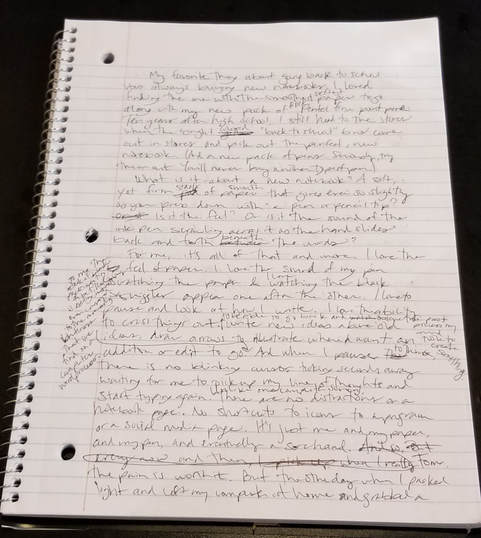|
My favorite thing about going back to school was always buying new notebooks. I loved finding the one with the smoothest, softest paper to go along with my new pack of black Pentel fine-point pens. Ten years after high school, I still head to the stores when the bright colored “back to school” bins come out and pick out the perfect notebook. (And a new pack of pens. Seriously, try them out. You’ll never buy another type of pen.) What is it about a new notebook? Is it the feel of a soft, yet firm stack of smooth paper that gives ever so slightly as you press down with a pen or pencil tip? Or is it the sound of the ink pen scrawling across the paper with the complimentary whisper of one’s hand sliding back and forth beneath the newly written words?  For me, it’s all of that and more. I love the feel of paper. I love the sound of my pen scratching it, and I love watching the black squiggles appear one after the other. I love to pause and look at how I write. The ability to cross things out. To be able to go back and observe the past process my mind took to create something. To be able to write new ideas above old ideas, draw arrows to illustrate where I want an addition or edit to go. To me, the stack of blank pages waiting to be filled is exciting and motivating, a complete contrast to the daunting and stifling never-ending whiteness that glares at me from a computer screen. When I pause and think with a pen in my hand, there is no blinking cursor ticking seconds away, waiting for me to pick up my line of thoughts and start typing again. Unlike on computer screens, there are no distractions on a notebook page. No icons to open up a program or a social media page. It’s just me and my paper, and my pen, and eventually, a sore hand. But, the pain is worth it. The other day when I packed light and left my computer at home and grabbed a notebook instead, I began to wonder why I like the pen and paper method of writing even though I have a computer and the skills to use it. Anything I want to share with the world has to be typed at some point, so why waste time writing it out first? And am I the only one that often prefers a notebook to a computer screen? As I sat next to my friend, who was also writing in her own notebook, making plans for her stationery and card-making business, I knew I couldn’t be the only one. As I thought more about it, I recalled a NaNoWriMo meetup writing session last year. I went and wrote in the company of strangers, and I took a notebook because I didn’t want to be distracted, and I wasn’t sure how much space I’d have. Or if I’d have access to an outlet in case my computer died on me. Notebooks never run out of batteries. Once seated at a table, I noticed that another writer had her own notebook, too. She said she hand-writes all of her stories. I kick myself now for not thinking to ask why. Handwriting whole novels is quite an impressive feat. I hand write some pages of stories I am working on, but I usually type majority of my drafts. Still I wonder, is one way better than the other? Before I delve into a little bit of science (yes, there is a research element to this post), I tried to determine if I write differently than I type and if my brain works differently when I write or type. There are a couple things that stand out when I reflect on how I feel when I use a pen versus when I use a keyboard. In addition to the physical joys of holding a pen in my hand as I skip across the page and leave black marks everywhere, I do believe that I become immersed more deeply in the story or article I am writing when I hand write the draft. Most people are faster typers than they are writers. I probably am too, but I make a lot of mistakes, and I am constantly correcting them, backspacing phrases and ideas and fixing grammar as I type. When I write, and I write quickly, I can forgive my errors, knowing that I’ll correct them later. There are no red or green or blue squiggly lines that appear as I write to alert me that there is an error in need of correcting. I also feel that everything is a bit more seamless when I am writing by hand. I hardly sense when I pause and play a scene out in my head. The words my inner voice calls out to my hand to spell out are loud and clear and the visions in my head are vivid. Sometimes when I’m typing, it feels like what I am imagining is further away. It’s not as easy to drown out the outside world and let the scenes in my mind take over when I type compared to when I write. But that’s just me. What do the scientists say? While I couldn’t find scientific research done on the benefits of writing or typing for creative writing (and I’ll admit, I didn’t try to dig too deep into that topic; if you find some studies, please share), I did find reports and articles on how writing is beneficial for note-taking and memory. Here are some of the top reasons that physically writing things out is more beneficial than typing: Writing forces you to be selective and helps you recall more things. Because most people write more slowly than they can type, when one writes notes, they have to pick and choose what they write down to remember later. If you can’t write down everything from a lecture, you will probably be paying more attention to the content of the information, because if you have to use the information later, you’ll have to rely on your memory in addition to your notes. Contrast that to being able to type everything you hear, you don’t have to absorb words at the time you hear them because you know you’ll have everything that was said later. In one study, students who took handwritten notes performed better when asked to recall the information. Writing is a tactile activity and helps you learn. The act of using a pen or pencil helps create a physical memory, which helps information sink in more completely. It is similar to the idea of “learning by doing.” One study done at the University of Marsaille found that different parts of the brain are activated when trying to read letters of a foreign alphabet that were learned by writing compared to those learned by typing. And the memories made by writing were stronger than those made by typing. Writing stimulates neurons in the brain. Much like the ever-popular wellness activities of meditation and yoga, writing can help you relax and affects the brain much like these mind and body exercises. Mainly because it helps you slow down and engage more completely in the process of creating something. It can also help cognitive development, according to a study done at Indiana University. Let’s see which is more popular: writing things by hand or typing them. Participate in a short survey to let us know what you prefer and why. We’ll share the results in a later blog post. Sources: https://www.npr.org/2016/04/17/474525392/attention-students-put-your-laptops-away http://journals.sagepub.com/doi/full/10.1177/0956797614524581 https://www.sciencedaily.com/releases/2011/01/110119095458.htm https://www.forbes.com/sites/nancyolson/2016/05/15/three-ways-that-writing-with-a-pen-positively-affects-your-brain/
1 Comment
|
AuthorWrite something about yourself. No need to be fancy, just an overview. Archives
September 2018
Categories |
